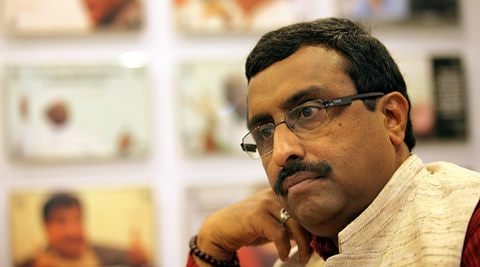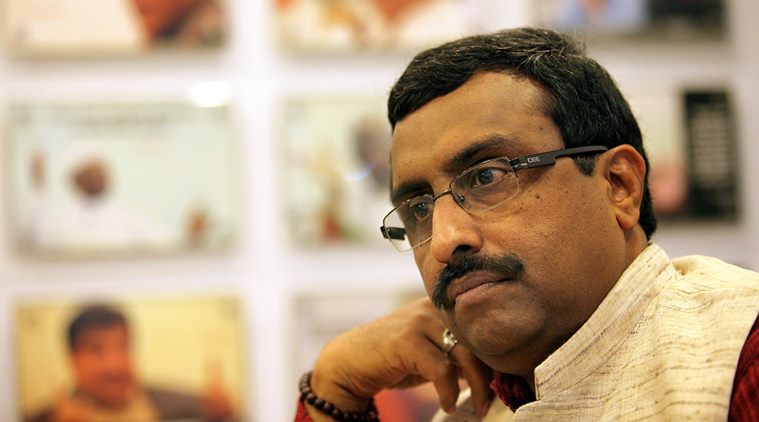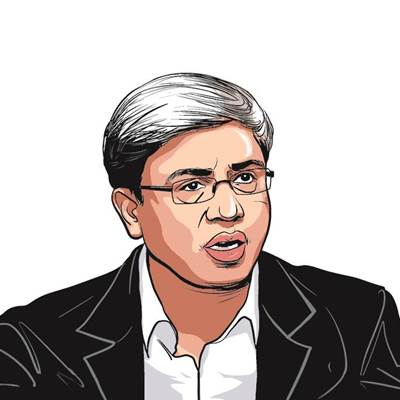Opinion A Dangerous Worldview
Reunification of a divided India is the unfinished civilisational task of the RSS.

 Ram Madhav, BJP National General Secretary. (Express photo by Ravi Kanojia)
Ram Madhav, BJP National General Secretary. (Express photo by Ravi Kanojia)
Ram Madhav, general secretary of the BJP touched a raw nerve when he spoke of the hidden dream for an Akhand Bharat in an interview. The interview was badly timed as that very day, Prime Minister Narendra Modi had dropped in at Lahore. Pakistan was puzzled. The world was confused. The Modi government was red-faced. The BJP tried to distance itself from Madhav but the world again saw the hidden agenda of the RSS.
Madhav later wrote that Akhand Bharat is a cultural construct for the RSS, not a political imperative, and that India, Pakistan and Bangladesh will be one unit someday — not by force but by consensus, by democratic means. What he did not reveal was that the RSS has till date not reconciled itself with Partition, for which it has not “forgiven” Muslims. The RSS harbours a vengeance against Pakistan, continuously expressed in off-colour utterances. Given the opportunity, it would like to erase that country from the planet because its very existence defies the logic of the RSS and its Hindutva: That all those who live across the Himalayas till the river Indus and the sea are Hindus and one nation, one race.
Christophe Jaffrelot writes that V.D. Savarkar considered the Indus the western border of the Hindu nation. Savarkar wrote: “Sindhu in Sanskrit does not only mean the Indus but also the sea. … so that this one word Sindhu points out almost all the frontiers of our land at a single stroke. … and so the epithet Sindhustan calls up the image of our whole Motherland: The land that is between Sindhu and Sindhu — from the Indus to the sea.”
For the RSS, anyone who lives between the Indus and the sea is Hindu. In its opinion, we have all been living here as a civilisation for centuries and share a common way of life. Those who converted to Islam or Christianity have not come from outside but have been living here from Vedic times. They are also “Hindus”. In the words of Savarkar: “The Hindus are not merely the citizens of the Indian state… They are united … also by the bonds of common blood”. For the RSS, despite religious barriers, the same blood flows in all of us and so we are one and should live as one entity; Partition was a betrayal of this civilisational construct.
To the discomfiture of the RSS, during the freedom struggle, separatist Muslim leaders propagated the two nation theory successfully, destroying the RSS’s one Hindu nation logic. The battle for Pakistan was not merely political but civilisational. Syed Ahmad Shah said in 1887, “Our nation is of the blood of those who made not only Arabia, but Asia and Europe, to tremble”. Jinnah said Hindus and Muslims form two nations and cannot cohabit because they belong to two different civilisations. The RSS believed that Gandhiji could have saved “Hindus” from being divided had he not agreed to Partition. Savarkar also suffered from this grudge, the reason for his alleged role in Gandhiji’s assassination. Savarkar was tried but escaped conviction on technical grounds. The reunification of a divided India is the unfinished civilisational task of the RSS. It can be likened to Hitler’s policy of AnschluB.
Hitler’s propaganda minister, Joseph Goebbels, used to say about Austria: “This state is not a state at all. Its people belong to us and will come to us. The fuhrer’s entry into Vienna will one day be his proudest triumph.” Hitler wrote: “German Austria must return to the great German mother country… One blood demands one reich.” Goebbels talked similarly about Czechoslovakia.The idea of greater Germany was an exciting idea for the Nazi party in the mid-1930s but it created havoc and brought destruction to the world. Similarly, in today’s hyper-nationalistic times, Akhand Bharat may have great appeal. Speaking against it might invite the wrath of the cyber lynch mob. But the fact is that territorial boundaries have been drawn on this subcontinent for eternity. Any attempt to forget this will lead to untold miseries. Hitler’s vision of “national redemption” was dangerous for Germany. Madhav’s similarly misplaced worldview sends shivers down the spine when he talks of Akhand Bharat.


